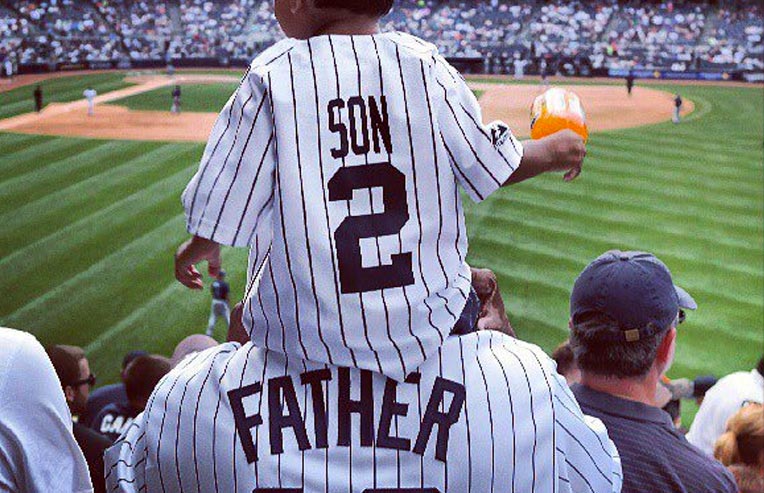
- 3592 Views
- 04/29/2020
- April Morganroth
It took THAT look in my 8-year-old son’s eyes as he fought back tears of anger and disbelief to realize just how alive and well daddy-ball still is today. I had hoped there was some sort of miracle in the last 25-years where daddy-ball had faded into a faint scar for today’s youth sports parents. Sadly, that look told me all I needed to know as I walked away from the field with my arms around my son’s shoulders.
The coach’s son finally showed up to the game, late as usual because his mom took him to a swim meet first. That’s when the coach decided to yank my son off the field and replaced him with his son. I’m not going to sit here and say my son is an All-Star, but he has emerging talent. He worked hard to show his coaches he deserved to play catcher or first base. He spent half of that game working hard on first base. Before this swap, the team was up by 5 runs going into the second half of the game.

The final score was 12-to-21, a devastating loss. From that moment the coach put his son in, the team suffered. It was no secret to the team or parents, the coach’s son hated sports. He showed his disdain for sports by messing around on the field, chasing his team around, or throwing his glove at his teammates.
That wasn’t an isolated event either. That first season of coach pitch was miserable for our son and the rest of the team. One parent even attempted to have a heart-to-heart with the coach. The coach wouldn’t hear it. In fact, his reply was “my son is destined for the major leagues.” The head coach made similar calls over-and-over again that entire season. The team had started with 13 kids on the team, we ended with 8. The team had to forfeit the last 3 games of the season.
What exactly is Daddy-Ball?
Daddy-ball is when a coach puts their kid in to play positions their child desires, regardless of skill or interest, above and without regard to other players on the team. A lot of times the coach’s kid also gets more playing time or individualized attention during team times. As a youth sports coach and mom, I can tell you there is nothing more painful to witness than seeing another coach make calls to benefit and advance his (or her) own child’s development over that of the entire team.
When only the coach's child matters
A few seasons ago on our middle son’s team, we witnessed a less obvious form of daddy-ball from one of the assistant coaches. Our middle son is autistic and the league has two teams comprised of special needs children. It was clear from the first practice this particular coach had no desire to be there. He constantly showed up to practices and games late because he was “coaching his older son’s team.” When he WAS there, he spent MOST of his time only with his child. He often completely ignored the rest of the kids.
In this case, the coach was only interested in furthering the talents of his child by giving him extra attention and practice, while ignoring the rest of the team during designated team times. It was heartbreaking to watch. Not just for myself, but also for our son – who couldn’t understand why he only got one round at the hitting station that this coach was in charge of during practices. The assistant coach’s son got multiple attempts at the hitting rotation but no other child did.
The Dos and Don’ts of addressing Daddy-Ball
After enduring a daddy-ball situation, navigating the emotions of your youth athlete and yourself can be tricky. While you should not turn into a helicopter parent, there are several things you can do. In speaking to youth sports coaches, high school coaches, and college coaches, we comprised this list of dos and don’ts in approaching this painful experience with your athlete.
DO:
- Do step away from the “highlight reel” of your child’s athletic career and have an honest look at their level of talent, progress, commitment, attitude, and dedication. Write these things down to discuss with the coach after practice. – ASU Football Coach
- Do consider taking up a different position to work on for the duration of the season. – High School Baseball Coach
- Do get involved with your child’s team by offering to step-up and help during practices and games. – U of A Athletics Director
- Do give your child a voice; help them come up with talking points to talk to the coach after practice. – High School Athletics Director
- Do stay positive, these things have a way of working themselves out. – Youth Sports Coach
- Do contact the league, athletics department involved if speaking to the coach does not address the concerns. – Former College Coach
- Do show empathy and understanding to your youth athlete by listening to their concerns and emotions without judging. – Youth Sports League Director
DON’T:
- Don’t make assumptions. Make an attempt to speak to the coach privately later.
- Don’t quit. Find out if there are any alternatives available.
- Don’t trash talk the coach in front of the youth athletes or with other sports parents. However, it is okay to ask other parents if they have the same concerns.
- Don’t just sit there and take it. Find a way to appropriately address it with the coach.
- Don’t get your child involved in the parent/adult politics of daddy-ball.
- Don’t slam the coach or program on social media, to other parents or family members. Your experience with one coach does not mean all coaches in the program are the same.
- Don’t dismiss your child’s feelings about this topic without taking an honest look into their concerns first.
Moving on from Daddy-Ball
Experiencing daddy-ball is never a fond memory for youth athletes or parents, but it is an experience both can learn from. You can discuss your daddy-ball issues with other sports parents in the Sportlo community and ask them for advice.
Your youth athlete will quickly learn the ugly side of sports. Yes, it’s unfortunate, but it does give them a taste of what could come thus preparing them for how to handle it down the road. Daddy-ball changes in high school and into college. There are certainly a lot of youth athletes with a whole lot of talent and heart that never make it on a high school or college team. Transversely, there is an equal amount making it into high school and college sports programs, who shouldn’t.
It gets better over time
High school and college coaches make every effort to bring in well-rounded athletes. However, on occasion, some slip through the cracks, and others turn rotten. An experience of daddy-ball at this level will look differently, but will essentially be the same thing. Whether intentional or unintentional, coaches naturally gravitate toward certain players and personalities. It isn’t bad or good, it just is.
Youth sports parents learn they must work with their youth athletes outside of team practices and games more consistently after experiencing daddy-ball. A lot of parents learn how to turn an experience like this into a positive outcome for their athletes.
Look for alternative solutions
It is important sports parents look into alternatives now in the event their athlete encounters a daddy-ball situation. First of all, parents, don’t quit. Your child made a commitment to the team, so stick it out. Follow the dos and don’ts we comprised above. However, if the coach or league does not address the concerns and your athlete becomes adversely affected – do think about finding alternatives.
Is there another team on the league your child can move to? Can you switch leagues? Can your child play-up if they are ready or play down? Be honest with yourself, your youth athletes, and their talents to make the best decision you can. Most importantly, parents, situations like this give our youth athletes the tools they will need as adults in similar life experiences. Be patient, listen to your child, and be their advocate.
_____________________________________
April Morganroth is a Multimedia, Print, Broadcast & Digital Journalist. She is also an Anchor & MMJ Reporter at iHeart Media as well as a Baseball Mother, Coach, and Sportlo contributor.





Add Comments